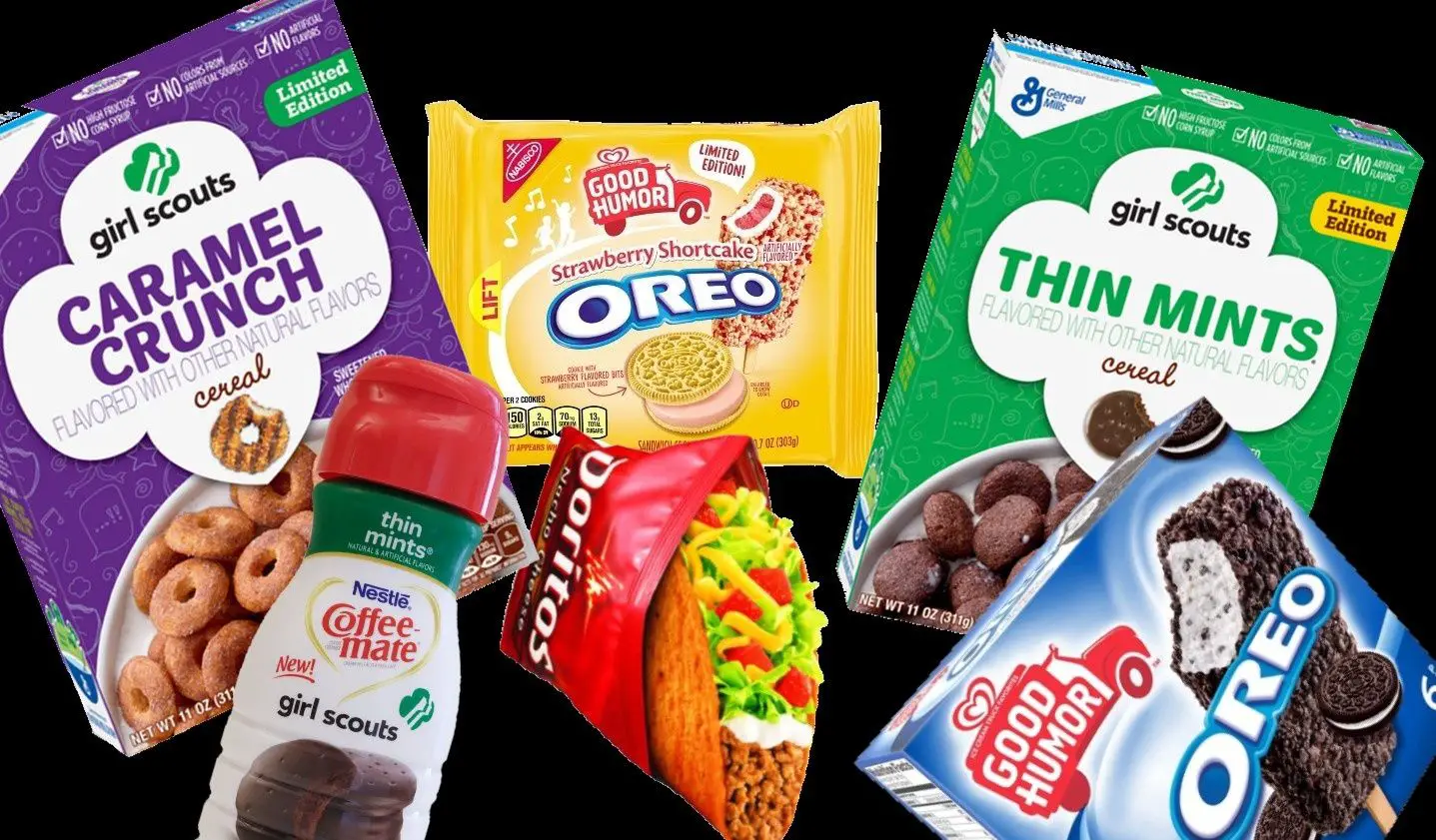Late Capitalism Diaries: Doritos Locos Tacos, Girl Scout Cookies, and the Horror of Brand Collabs
Brand collaborations move us one step closer to the erasure of all culture
Today the world is celebrating the fact that Girl Scout Cookies are being sold online and Taco bell is giving out free Doritos Locos Tacos for Taco Tuesday.
It makes sense to celebrate. Free food is a blessing at any time, and more so now—amid unprecedented layoffs and financial uncertainty. Likewise, the convenience of an exclusive seasonal snack now being delivered to your door will be a welcome comfort to many people who are stuck inside under quarantine—and no one will need to be coerced by a small child into buying more than they actually want. But what many people may not have realized was that there was already a way to order your Thin Mints online—as long as you could stomach the idea of eating them in a bowl of milk.
A collaboration between General Mills and the Girl Scouts of America produced two different "limited edition" Girl Scout Cookies cereals that were released in 2017 and are still available to this day. Likewise, Breyer's has teamed up with the GSUSA to produce Thin Mint and Samoa ice creams, and Dunkin' Donuts has Coconut Caramel (Samoa) and Thin Mints flavored coffees. But the Girl Scouts don't own the combinations of caramel and coconut. Couldn't they sell those flavors without paying to license the Girl Scout Cookies brand? There's zero chance the coffee and the cookies and the cereal actually share more than one or two lab-produced chemicals in common, so why treat a brand as a flavor?
The answer is that people trust brands. They get warm feelings when they think about how much they enjoy Girl Scout Cookies, so that even people who might not care for Dunkin' Donuts will be drawn in by the thought of coffee that tastes like a Samoa—and even has the GSUSA stamp of approval. It's the same thing that happened with Taco Bell and the Doritos Locos Taco—an imitation of a traditional hard shell taco combined with an imitation of a nacho.
It's the same concept that led Post to produce a Twinkies cereal and General Mills to cerealize Drumsticks. Why come up with a new flavor or concept when you can just tap into one that people already respond to? People like Ikea, right? And Pizza Hut? Alright then, Ikea can sell a table based on those plastic pizza savers, and Pizza Hut can sell a pizza with Ikea Swedish meatballs! (Yes, that is actually happening right now in Hong Kong).
We have often been told by the people who benefit from our system and by children of Cold War propaganda that capitalism and the profit motive naturally breed innovation. That is sometimes true, but capitalism—particularly in the form of massive conglomerates—also abhors unnecessary risk. Don't try something new if you don't have to. Stick with what works!
Considering the amount that we have all been saturated with branding our entire lives—and with the corporate consolidation that has resulted in nearly all of those brands being owned by one of a dozen mega-corporations—these mash-ups are likely to become even more common. As it happens, it's important to note how they further alienate us from the fact that foods and flavors and concepts can even exist without branding. What good are chocolate and mint without the Thin Mints brand?
Once upon a time culture was thought to be a collection of shared values, customs, and understandings. It was never perfect—it almost always included a lot of misogyny and xenophobia—but it is quickly being replaced by something far stranger. Brands are the new culture, and culture is trademarked. Glad is trash bags and Febreze is air fresheners, and if you want trash bags that smell nice, you're in luck! Because Febreze and Glad are both owned by Proctor & Gamble, who will happily produce your Febreze-scented Glad trash bags.
While this strangeness exists in every aspect of our society, food is perhaps where the problem becomes most obvious and disturbing. Food is such an essential part of cultural tradition. Even in a country like England (not exactly revered for its cuisine) a classic dish like strawberry shortcake could be a source of pride and belonging—a legacy recipe to be passed from generation to generation. If a major brand of cookies wanted to make a cookie based on that flavor and tapping into those feelings, it would make a lot of sense.
But no. Not enough people have that warm feeling attached to real strawberry shortcake anymore. What more people remember from their childhood—what tastes the same everywhere in the world—is a strawberry shortcake-flavored Good Humor bar, so Oreo made a cookie based on that. And Mocha Oreos? Not good enough. Make it Dunkin Donuts Mocha, and throw a familiar logo on the package, and then you're in business. A simulation of a simulation is better than the real thing, as long as it can be mass-produced and wired into vague feelings of nostalgia—nostalgia that is increasingly untethered from any historic notion of what previous generations considered food. Strawberries? Cream? No, Good Humor.
Everything becomes a Xerox of a Xerox of a Xerox until we forget that Xerox is itself just a brand. This is what Jean Baudrillard wrote about in Simulacra and Simulation. Our society replaces reality with symbols and imitations until the reality is erased, and we become alienated from any sense of origins or a solid reality at its base. The map becomes the territory, the flavor becomes the brand.
